What is Solana? Solana is a high-performance Blockchain platform targeting hundreds of thousands of TPS with almost zero transaction costs. To achieve this efficiency Solana has a combination of Proof Of History and Proof Of Stake.
Solana is a typical example of the Monolithic Blockchain concept and has been very successful in recent times. Solana is built for Dapps and Decentralized Marketplaces. Everyone, let’s learn about Solana together!
What is Solana?
History begin
Solana with the legal name Solana Labs, Inc was founded in 2017 by Co Founders Anatoly Yakovenko, Greg Fitzgerald, Raj Gokal, Stephen Akridge and Zed Zed in San Francisco, California.
Factors that form Solana
Solana is a blockchain with Proof Of Stake consensus mechanism combined with Proof Of History. Proof Of History is the highlight that helps the transaction speed on Solana theoretically reach hundreds of thousands of TPS with almost zero transaction costs. So what is Proof Of History? How does Proof Of History work?
What is Solana’s Proof Of History magic mechanism?
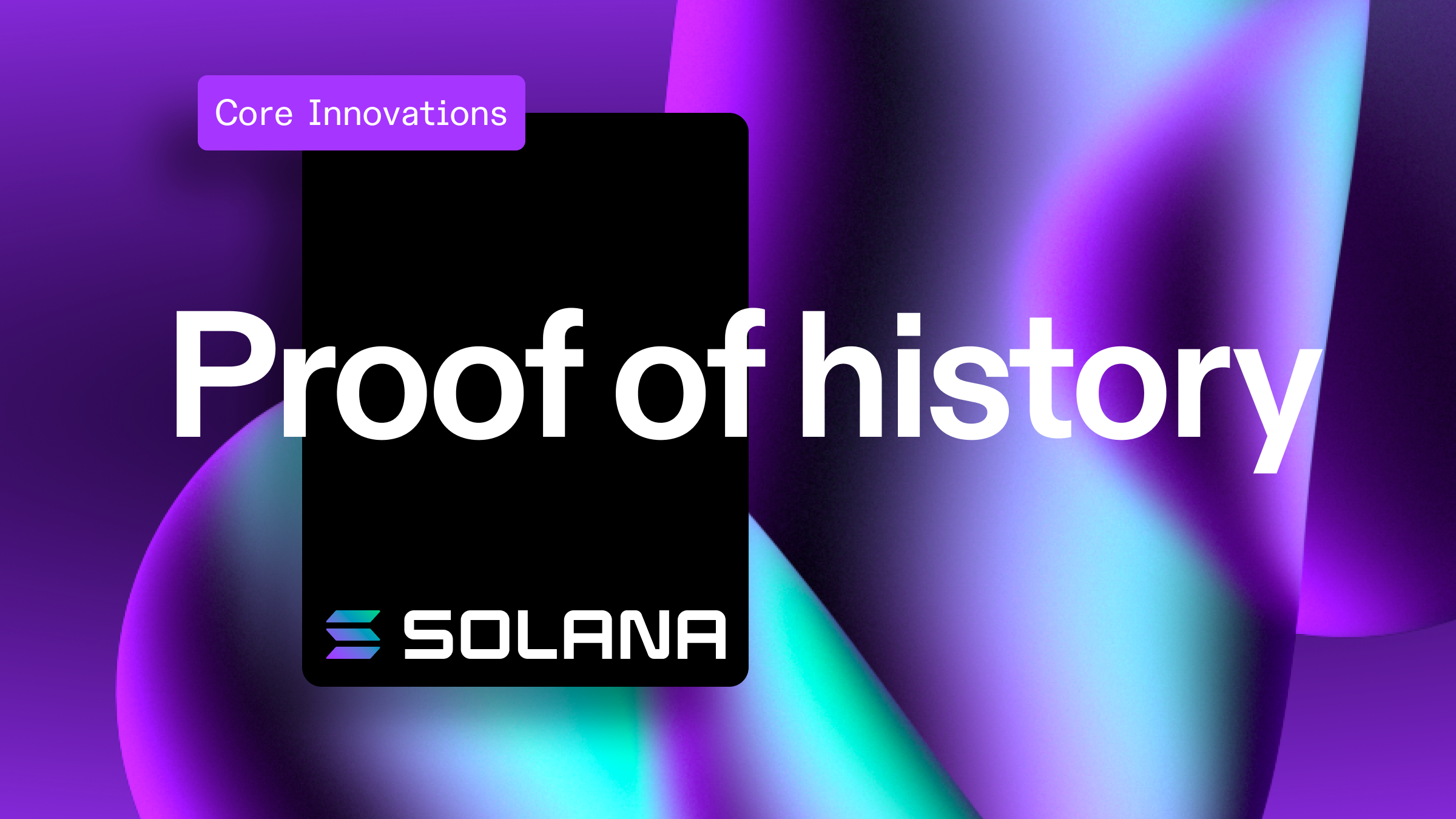
Many users mistakenly believe that Proof Of History (POH) is Solana’s consensus mechanism similar to Bitcoin’s Proof Of Work, Ethereum’s Proof Of Stake,… but the truth is that it is not like that. Proof Of History is a technique in the Solana consensus that helps solve remaining problems in the mempool of Bitcoin or Ethereum. Thanks to solving that problem, Solana has the speed of light.
And that problem is to rearrange the way to confirm the order of transactions when put into the mempool, thereby solving the Timestamp problem.
- Timestamp here means “time stamp”. The importance of Timestamp lies in marking and synchronizing data during the process of verifying the validity of the transaction.
Solana itself uses the Proof Of Stake consensus mechanism but has internal refinements thanks to Proof Of History.
What is Proof Of History? How can Proof Of History help Solana?
Simply put, thanks to Proof Of History (POH), nodes on Solana’s network can successfully create the next blocks without worrying about all previous blocks.
For example:
Process to successfully add transactions to a block on Bitcoin. First, the entire transaction will be sent to a mempool without the exact time, date, or time, only information about where it goes and the transaction fee. Of course, miners will choose the transaction with the highest fee and prioritize it at the top, along with filling in information such as date and time to complete it into the block. This makes the process quite confusing.
With Proof Of History (POH), those steps will be simplified and simplified. Validators can add a large number of transactions and blocks without going through a cumbersome process like Bitcoin, so the transaction speed is much faster. . Besides, in theory, Solana can increase transaction speed up to 700,000 TPS, a very unbelievable number in the crypto market.
Solana’s ecosystem
Development process
During the development process, there are factors that help Solana be very successful today and from this can be a framework to apply to many other ecosystems:
- Proactively build important pieces of infrastructure, especially Oracle because the time Solana was built was the DeFi summer, and for DeFi, Oracle is the most important. Solana proactively built Pyth Network instead of hiring Chainlink’s services from the beginning.
- Continuously organize global hackathons. Compared to Layer 1 hackathons that only cost a few hundred thousand dollars each time, if they do million dollars, they only do it once every 1 year – 2 years, while Solana has 2 hackathons per year, each hackathon is worth 3 – $5M.
- February 15, 2021: Solana Foundation combined with Serum to organize the first hackathon with a total prize value of up to $400K.
- May 15, 2021: Solana organizes Solana Season with a total prize value of up to $5M. The event attracted 13,000 developers and 350 teams to participate.
- August 31, 2021: Solana organizes Ignition – A Global Solana Hackathon with a total prize value of up to $5M. The event attracted 6,000 developers with 568 projects completed and registered when the event ended.
- February 2, 2022: Solana organizes Solana Riptide Hackathon with total prizes up to $5M. The event attracted 7,000 developers with 550 projects completed and registered when the event ended.
- July 11, 2022: Solana organizes Solana Summer Camp Hackathon with total prizes up to $5M. The event attracted 18,000 developers with 750 projects completed and registered when the event ended.
In addition to the hackthon events officially organized by the Solana Foundation, there are many other small hackthons that the Solana Foundation sponsors. From these hackthons, Solana’s ecosystem began to form the first puzzle pieces about DeFi, NFT, Web3, Gaming,…
- The appearance of Tether (USDT) and Circle (USDC) is probably the turning point of Solana’s ecosystem in September 2020. With USDC, USDT, the Solana ecosystem officially entered the boom phase.
What are the pieces that make up the Solana ecosystem?
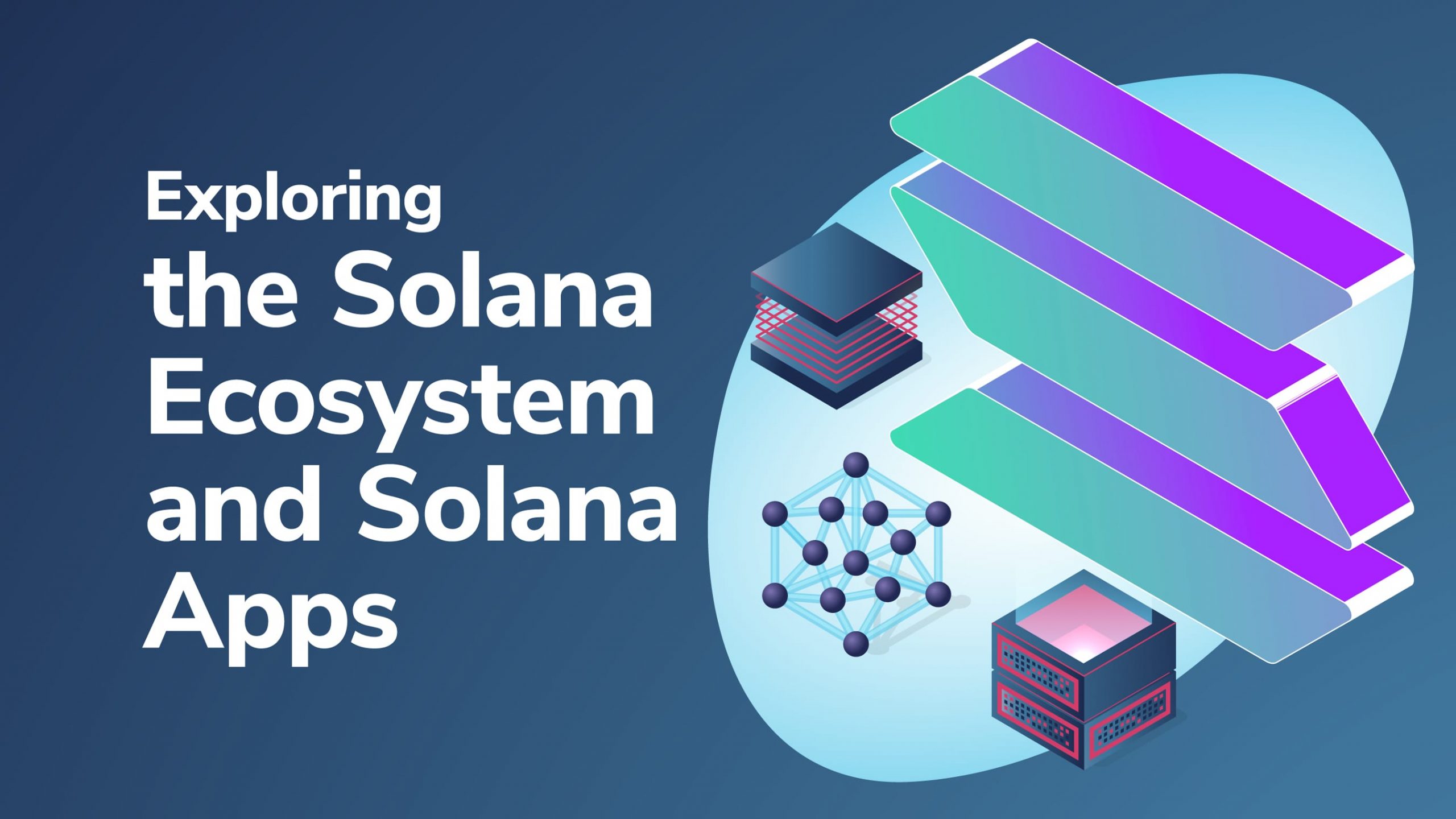
With the above hackathons, the number of projects on Solana exploded and it can be seen that Solana is the only place other than Ethereum to create a trend for the market for the first time. There were 2 points where Solana pulled the whole market while the market was clearly decreasing.
- NFT Marketplace & NFT Marketplace.
- Especially the StepN project developed on Solana has exploded the Move 2 Earn trend.
Take a look at outstanding projects on the Solana ecosystem
- About DeFi:
- DEX: Orca, Raydium, Atrix, Serum, Jupiter, Mercurial Finance, Aldrin, Lifinity, Crema Finance, Saros, GooseFX, Cyclos, Solanax,…
- Lending & Borrowing: Jet Protocol, Solend, Apricot, Hubble, UXD, Port Finance, Larix, Ratio Finance, Oxygen, Soda Protocol,…
- Liquid Staking: Marinade Finance, Lido Finance, aSol, Eversol, Stafi,…
- Options: PsyOption Katana, Frikkton, Ribbon,…
- Yield Farming: Moonfarm, Tulip Protocol, Quary, Francium,…
- About Gaming: Star Atlas, DeFi Land, Genopet, Aurory, Panzerdogs, Cryoptowar, CryptoPets, Portals, Meta Waifus, BR1 Metaverse, Gamerplex, Decimated,…
- About NFT & NFT Marketplace: Magic Eden, Solsea, Digital Eyes, Exchange.Art, Naga Kingdom, HDOKI, Space Falcon, Solido Gamesm,…
- About Web3: Audius, Grape Protocol, Panzer Dogs, Kala Network, Woof Solana, PIP, Sovân, Kitty Coin, Tweth, Sator, Chingari, Uhive, Chillchat, Communi3, HeirCompany,…
What is the problem with Solana?
The main problem of Solana today is that the network is constantly congested, leading to shutdowns, validators have to restart the network together, this causes certain worries for users because assets if on the networks Lending platforms can be liquidated without reacting. To solve this painful problem, Solana plans to make the following changes:
- Quick: A protocol developed by Google that will replace Solana’s existing user data protocol. QUIC includes flow control capabilities where the network can repel intrusive bots and bulk transaction spam.
- Stake Weighted QoS
- Fee Markets: With this update, users can proactively request the fee they will pay for each similar transaction on the Ethereum network. This expects users to pay different fees and not spam transactions leading to network congestion.
Core Team

Anatoly Yakovenko: Co Founder & CEO at Solana Labs
- Anatoly holds a Bachelor’s degree in Computer Science from Illnois Urbana College.
- Anatoly and some members built startup Alescere – a service provider for small and medium enterprises.
- Anatoly then left Alescere to work as a Manager at Qualcomm – a corporation specializing in manufacturing chips for famous phone companies.
- After that, Anatoly had two short periods as a software engineer at Dropbox and Mesosphere.
- In October 2017, during the uptrend of that year, Anatoly and some members founded Solana and have developed brilliantly to this day.
Greg Fitzgerald: Co Founder & CTO (Chief Technology Officer)
- There is not too much information about Greg, but for some information, Greg regularly researches embedded systems. Greg is also the creator of the 2-way RPC bridge between C and Lua in the BREW operating system.
Raj Gokal: Co Founder & COO
- Raj is an individual who works in many organizations in different positions. Notable among them are:
- Chief Development Officer of Omada Health – a digital platform for diabetes and heart disease prevention.
- Raj is also the co-founder of Sano, a company that monitors and predicts users’ health.
- Raj also has more than 1 year working with Stealth – a consulting platform for companies growing in the field of mental health.
Stephen Akridge: Co Founder
- Stephen has spent more than 9 years working with Qualcomm – a corporation specializing in manufacturing chips for famous phone companies. At Qualcomm, Stephen is in charge of Managing Engineers.
Investor
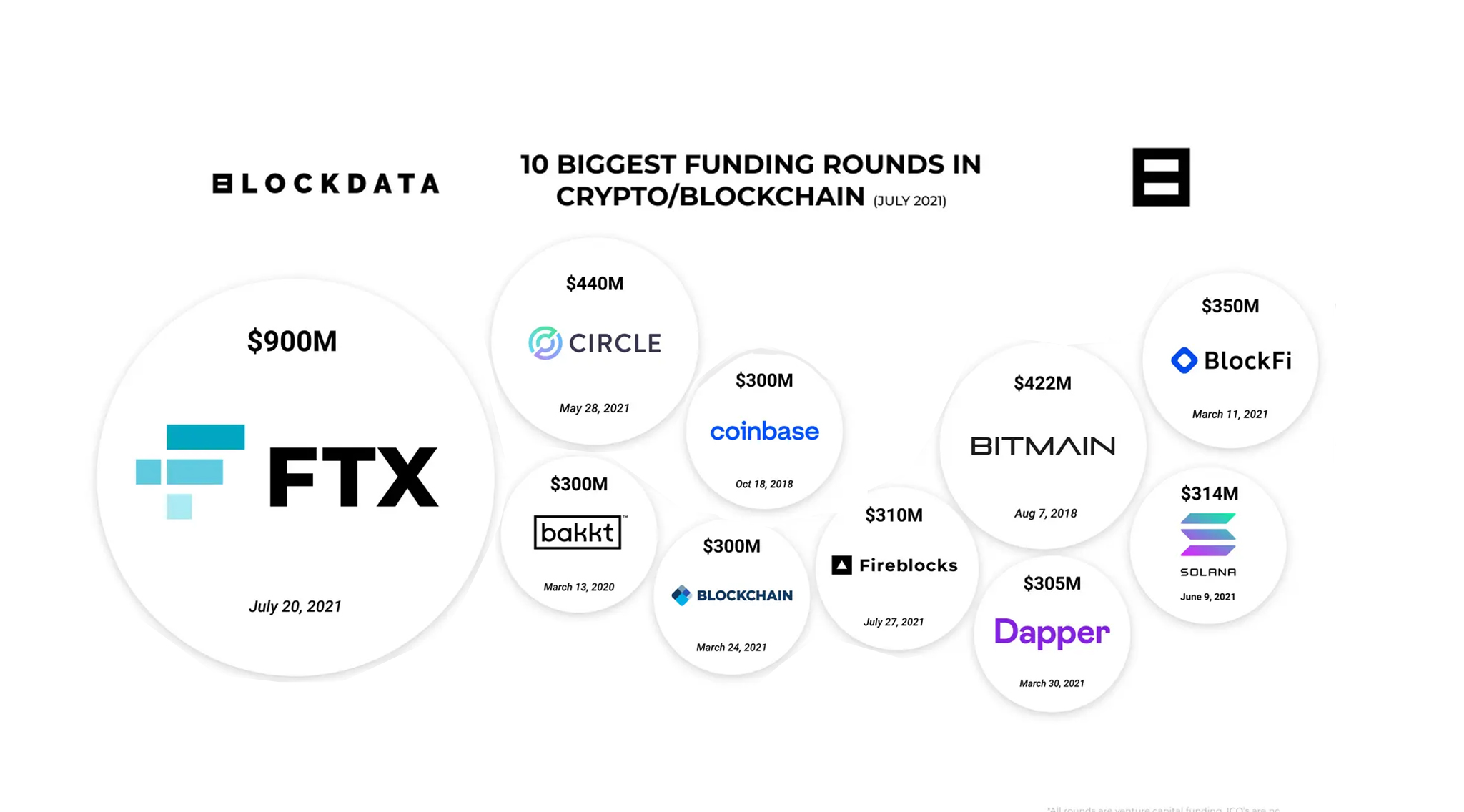
At the time of raising capital, Solana immediately entered one of the largest capital raising deals in the crypto market. At that time, Solana was the TOP lot and also the only Layer 1. As for Dapper Labs, Flow is just one of their products.
Solana has gone through many different capital calls but they have not shared information with the community. There is only one round that has relatively complete information:
- June 9, 2021: Solana Labs successfully raised a record amount of $314M with the participation of 21 different VCs led by Polychain and A16Z in addition to Multicoin Capital, ParaFi Capital, SeaX Ventures, Jump Trading, Genesis One Capital,…
Tokenomics
Overview information about Solana token
- Token name: Solana
- Code: Sol
- Blockchain: Solana
- Total supply: 508,180,963
Token Allocation
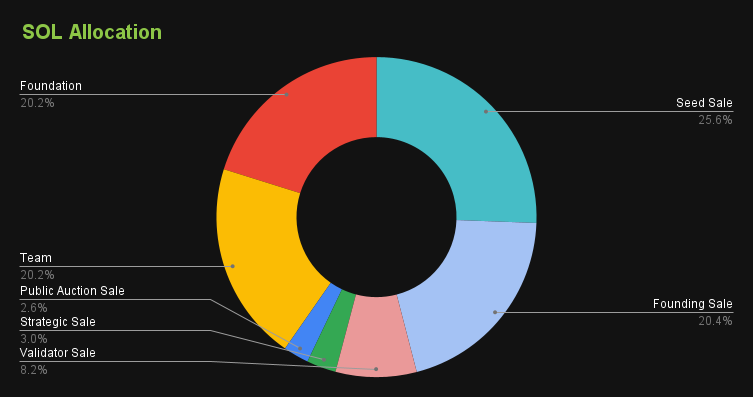
- Seed Sale: 25.6%
- Founding Sale: 20.4%
- Foundation: 20.2%
- Team: 20.2%
- Public Auction Sale: 2.6%
- Strategic Sale: 3%
- Validator Sale: 8.2%
According to the auction mechanism, Solana has been opened for ICO sale on Coinlist at a price of $0.22 per Sol.
Token Realease
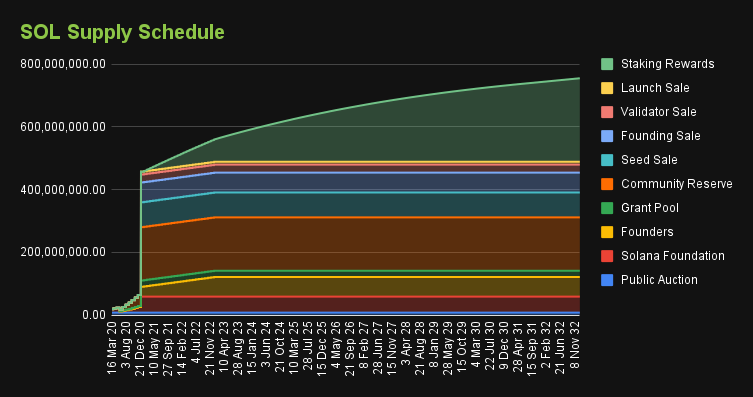
Solana will be opened gradually from 2020 until 2032. For %, most will be unlocked and paid in installments within 1 year. Only the Starking Reward part will be paid in installments until 2032. Up to now, almost all Sol of VCs, Teams, Foundations,… has been paid in full.
Token Use Case
- Solana can be put into staking to earn additional rewards
- Solana is considered a currency when used in the ecosystem to pay transaction costs within the system
Exchanges
Currently Solana is traded on many different exchanges such as Binance, Coinbase, FTX, Kraken, OKX, Houbi, MEXC,…
Information Channel About Solana
- Website: https://solana.com/vi
- Twitter: https://twitter.com/solana
- Medium: https://medium.com/solana-labs
- Telegram: https://t.me/solana
- Discord:
Summary
Solana is a high-performance blockchain, one of the blockchains with the fastest ecosystem expansion rate in the crypto market. However, Solana is also facing many problems related to scalability and is trying to find solutions.


